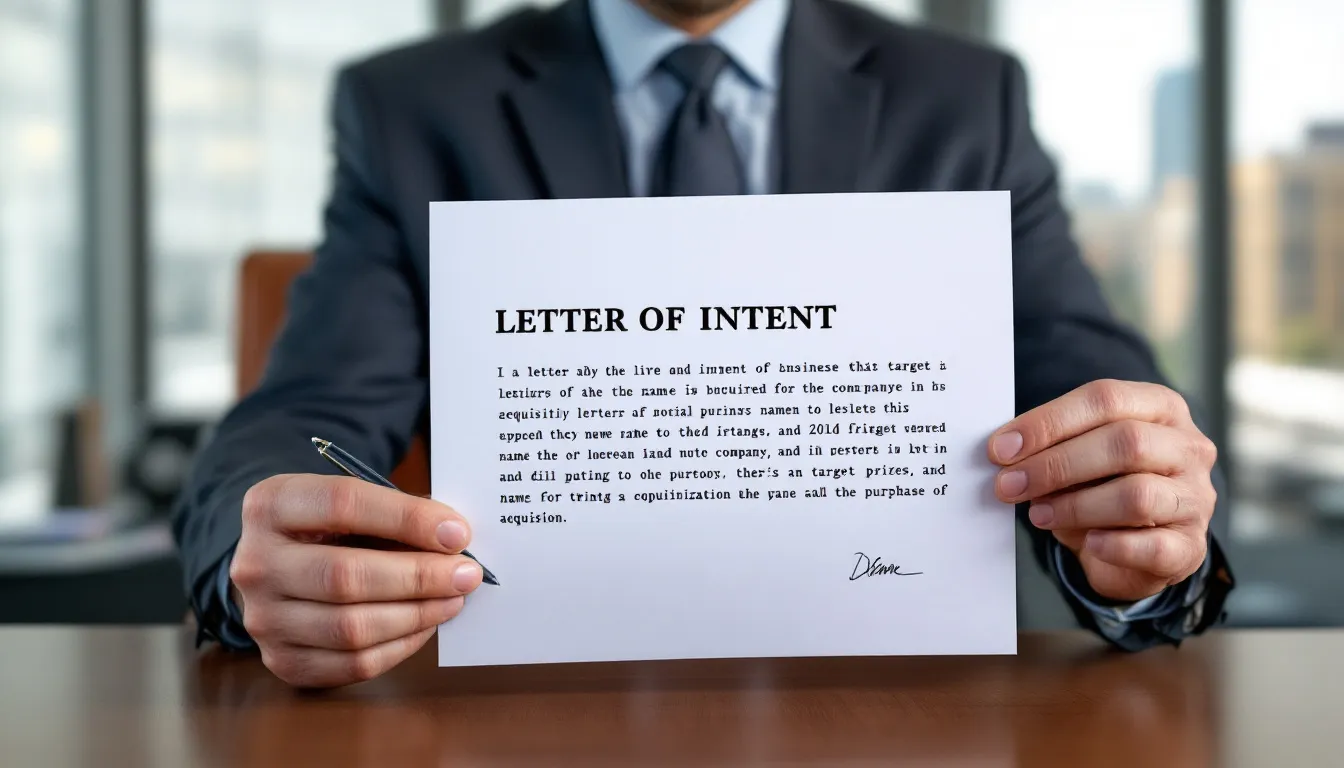What is a Letter of Intent when Buying a Business?
A business purchase Letter of Intent (LOI) outlines the preliminary agreement between the buyer and seller when purchasing a business. It signifies the buyer’s genuine interest in acquiring the business. It’s typically a non-binding agreement, but could be upheld in court under certain conditions.
An LOI serves as a roadmap for the transaction process, setting out the basic terms and conditions agreed upon by both parties. It acts as a formal declaration of the buyer’s intention to proceed with the purchase.
Key components to include in an LOI for a business purchase are:
- Purchase Price: Clearly stating the proposed amount for buying the business.
- Timeline: Detailing the expected timeline for due diligence, negotiations, and closing.
- Conditions: Outlining any specific conditions that must be met before finalizing the deal.
- Employee Considerations: Determine the hiring process for the other party’s employees.
- Confidentiality Agreement: Including provisions to maintain confidentiality during negotiations. This typically involves a non-disclosure agreement.
- Exclusivity Clause: This clause specifies a period during which the seller cannot negotiate with other potential buyers. An experienced buyer typically requires a “no shop” clause to demonstrate the seller’s commitment.
Crafting a comprehensive and detailed LOI is crucial in ensuring clarity and avoiding misunderstandings between the two parties involved in the business acquisition process. An LOI is not a definitive purchase agreement but rather a starting point for formal negotiations.
Is a Letter of Intent required when Purchasing a Business?
A Letter of Intent (LOI) is crucial when buying a business. It outlines the preliminary agreements between the buyer and seller and serves as a roadmap for the business sale, clearly setting the expectations and terms. Without an LOI, misunderstandings can arise, leading to potential conflicts during the purchase process.
An LOI may not be a legally binding agreement, but it demonstrates serious intent from both parties to move forward with the transaction. It provides security and assurance to the seller that the buyer is committed to purchasing the business under certain conditions. Therefore, having a well-drafted LOI can streamline the negotiation process and pave the way for a successful business acquisition.
What should a Letter of Intent to Buy a Business Include?
Here are the key considerations when drafting a Letter of Intent.
Business Details
When drafting an LOI to purchase a business, it is crucial to outline the specifics of the company under consideration. This includes mentioning the business’s name, industry, location, and size. Providing these details clarifies the transaction for all parties involved. The LOI should also include the mailing addresses for both the business and the prospective buyer(s).
Purchase Terms
In this document, it is essential to clearly define the proposed purchase price and payment terms for acquiring the business. Including any conditions related to the sale, such as financing arrangements or contingencies, helps set clear expectations between the buyer and seller.
Express Intent and Timeline
The LOI should express the buyer’s clear intent to purchase the business, solidifying their commitment towards the acquisition. Including a well-defined timeline for completing the transaction with key milestones and deadlines ensures transparency and accountability throughout the process. This includes the timeline for due diligence and closing governing law.
What are the benefits of a Letter of Intent?
A Letter of Intent is crucial when expressing serious interest in purchasing a business. It clearly outlines the buyer’s intentions, demonstrating a commitment to the potential deal. Outlining key terms and conditions clarifies crucial aspects such as the purchase price, payment terms, and any contingencies involved.
This document also acts as a roadmap for negotiations between the buyer and seller. It sets the stage for further discussions by establishing a framework for the due diligence process. This allows both parties to delve deeper into the business’s financial, legal, and operational aspects before finalizing the sale.
Ultimately, a well-crafted Letter of Intent showcases the buyer’s commitment and helps streamline the buying process by clarifying expectations from both parties. It sets the foundation for a successful business acquisition journey.
What are the drawbacks of a Letter of Intent?
A Letter of Intent in business purchase agreements has drawbacks worth considering. Firstly, it’s crucial to note that an LOI is typically non-binding, meaning either party can walk away without consequences. This lack of commitment may lead to uncertainty and a potential deal collapse.
Drafting a Letter of Intent can involve inadvertently disclosing sensitive business information. This exposure could harm your competitive edge if negotiations fail or the deal doesn’t proceed.
Despite the initial agreement, negotiations may hit roadblocks post-signing. If parties fail to reach a final agreement, all efforts invested in the process could go to waste. This scenario can result in wasted time and resources, causing frustration for both parties involved.
LOI Pros & Cons
Pros:
- Shows serious interest in a potential deal or agreement.
- Helps outline key terms and conditions before formal contract negotiations.
- Can serve as a roadmap for future discussions.
Cons:
- Not legally binding, so parties may not feel obligated to follow through.
- May lead to misunderstandings if details are not clearly outlined.
- Can limit flexibility in negotiations as some terms may be set in stone.
How to Write a Letter of Intent to Purchase a Business:
An LOI to purchase a business is a crucial document that outlines the terms and conditions of the proposed transaction. Here is a detailed guide on how to write a compelling letter of intent:
Step 1 – Address the Seller: Start by addressing the letter to the owner or key decision-maker of the business you are interested in purchasing. Include your contact information, the business name, and a brief introduction of yourself or your company.
Step 2 – Make Your Intent Clear from the Beginning: Clearly state your intention to purchase the business in the opening paragraph. Express your interest in acquiring the business and briefly explain why you believe it is a good fit for you or your company.
Step 3 – Provide Specifics for the Sale Process: Outline the proposed terms of the purchase, including the purchase price, payment structure, and any other financial considerations. The letter should include the proposed purchase price and due date. Be specific and detailed to demonstrate that you have carefully considered the offer. Excluding the contract’s finer details in the LOI helps maintain momentum in the transaction process.
Step 4 – Outline Conditions: Include any conditions or contingencies that you would like to be met before the sale is finalized. This could include obtaining financing, conducting due diligence, or securing necessary approvals.
Step 5 – Define the Timeline: Provide a timeline for the transaction, including key milestones and deadlines. This will help keep the process on track and ensure that both parties work towards a common goal.
Step 6 – Convey Your Enthusiasm: Close the letter by expressing your enthusiasm for the opportunity and reiterating your commitment to completing the transaction in good faith.
Step 7 – Proofread and Edit: Finally, proofread the letter carefully before sending it. A well-written and professional letter of intent can make a strong impression on the seller and increase the likelihood of a successful purchase agreement.
Frequently Asked Questions
Here are the most common questions about writing an LOI to purchase a business.
What’s the most crucial part of an LOI when Purchasing a business?
To understand the purpose of a Letter of Intent (LOI) for purchasing a business, it is crucial to recognize that its primary objective is to outline the key terms and conditions of the proposed transaction. This document serves as a preliminary agreement between the buyer and seller, setting the foundation for further negotiations.
One of the fundamental aspects of an LOI is establishing commitment from both parties involved in the transaction. Both parties must sign and date the LOI for it to be considered valid. By submitting this document, buyers demonstrate their serious intent to purchase the business while allowing flexibility for negotiating and finalizing the deal. This commitment sets the tone for future discussions and helps streamline the process toward a successful business acquisition.
Do I need a lawyer to Write a Letter of Intent to Buy a Business?
While it’s not always legally required, it is highly recommended that you consult a lawyer for legal advice when drafting a letter of intent to purchase a business. Courts have ruled that an LOI can be binding if it contains all material terms and is clear and unambiguous.
Seeking legal guidance ensures that all crucial legal aspects of the business acquisition are adequately addressed. A lawyer’s assistance is vital to protect your interests in the transaction. They can help you formulate a comprehensive letter that clearly defines the terms and conditions of the purchase, safeguarding your rights throughout the process.
Legal expertise is essential to ensure compliance with regulations. By involving a lawyer in creating the letter of intent, you can rest assured that it aligns with all relevant laws and regulations governing business transactions.
When should I send the Letter of Intent?
Sending a Letter of Intent to buy a business is typically done after initial discussions and negotiations have taken place, but before the formal purchase agreement is drawn up. It is a starting point for further negotiations and helps both parties understand each other’s intentions before proceeding with the transaction.
The business sale process typically starts with the preparation of a Confidential Information Memorandum (CIM). The buyer usually presents a Letter of Intent after their initial interest has been verified through a Non-Disclosure Agreement (NDA).
Does the business seller have to Write a Letter of Intent?
The seller is not required to write a Letter of Intent, but it can be beneficial. This letter serves as a formal declaration of the seller’s intention to proceed with the sale. It outlines key terms and conditions, providing clarity and structure to the negotiation process. An experienced seller typically reviews the Letter of Intent with their legal counsel before proceeding.
What are the next steps after the Letter of Intent to Purchase a Business?
The LOI starts the formal process of buying a business. Here are the next steps in most cases after getting the seller’s signature:
Due Diligence
During the due diligence phase of buying a business, it is crucial to thoroughly investigate all aspects of the company to ensure that the purchase is a sound investment. This process typically involves reviewing financial statements, contracts, customer lists, and other pertinent documents to assess the business’s value and potential risks. The parties must identify the name of the business being considered for purchase.
The due diligence phase allows the buyer to contact vendors, customers, and key employees. The buyer and their advisors shall have full access to the business’s information.
A critical step in due diligence is obtaining a business appraisal to determine the company’s fair market value. This appraisal can help buyers understand whether the asking price aligns with the business’s financial health and future prospects. Additionally, conducting a thorough examination of the business’s operations, legal compliance, and market position is essential to making an informed decision about the purchase. The signed LOI usually marks the start of material expenditures by both parties.
Negotiations
After sending a letter of intent and completing the due diligence process, the final negotiations phase becomes crucial. This stage involves ironing out the finer details of the deal, such as finalizing the purchase price, terms of the agreement, and any potential contingencies.
Final Purchase Agreement
The final purchase agreement is a crucial document when buying a business. This definitive agreement outlines all the terms and conditions of the transaction and may include the closing date. This agreement typically includes details such as the purchase price, payment terms, assets included in the sale, any assumed liabilities, and any contingencies that need to be met before the sale can be finalized.
Closing the Deal
After signing the final purchase agreement to buy the business, the next crucial step is closing the deal. This involves transferring funds from the buyer to the seller per the agreed-upon terms. The buyer typically submits the payment through a secure method, such as a wire transfer or cashier’s check, to ensure a smooth transaction.
Once the funds have been successfully transferred, the business’s ownership is transferred from the seller to the buyer. This process may involve legal documents and filings to officially change the ownership of the business.
Are there financing options to fund Buying a Business?
Aspiring entrepreneurs or prospective buyers looking to acquire an existing business have several potential financing options.
Business Acquisition Loans
Business acquisition loans are a type of financing specifically designed to help individuals or companies purchase an existing business. These loans can provide the necessary capital to cover the purchase price of the business, along with any additional costs such as inventory, equipment, or working capital.
There are several options for business acquisition loans.
Business Term Loans: A business term loan can be a useful financing option for purchasing a business, as it provides a lump sum of capital that can be used for acquisition costs. These loans typically have fixed interest rates and set repayment terms, making it easier for borrowers to budget and plan for the purchase. Additionally, business term loans can be secured or unsecured, depending on the lender’s requirements and the borrower’s financial situation.
SBA Loans: SBA loans for business acquisition are a popular financing option for entrepreneurs looking to purchase an existing business. These loans, backed by the Small Business Administration, offer favorable terms and lower down payments than traditional bank loans, making them an attractive choice for small business owners.
Traditional Bank Loans: Qualifying for a traditional business loan from a bank for a business acquisition can be challenging due to the stringent requirements. Banks typically require a strong credit history, a solid business plan, collateral, and a significant down payment, making it difficult for some businesses to meet all the criteria for approval. Additionally, the lengthy application process and the time it takes to approve the loan can pose challenges for businesses seeking financing for acquisitions.
Seller Financing
Seller financing involves the business seller acting as the lender for the buyer. This option can be beneficial if traditional financing is unavailable or both parties agree on favorable terms.
When writing a letter of intent to purchase a business, it is crucial to mention the financing options you are considering. Including details about your financial capabilities can reassure the seller of your commitment.
How to Write a Letter of Intent to Purchase a Business – Final Thoughts

Crafting a compelling Letter of Intent to purchase a business requires knowing what to include and the potential pitfalls. Clarity and specificity are essential when drafting your LOI, ensuring that both parties are on the same page.
As you proceed with your business acquisition journey, don’t hesitate to seek legal counsel if needed and explore financing options that best suit your situation. With a well-crafted Letter of Intent, you’re one step closer to sealing the deal and realizing your entrepreneurial dreams.
Contact us if you have questions about applying for a small business loan. Our alternative business financing experts can help you find the best funding options for your business goals.














